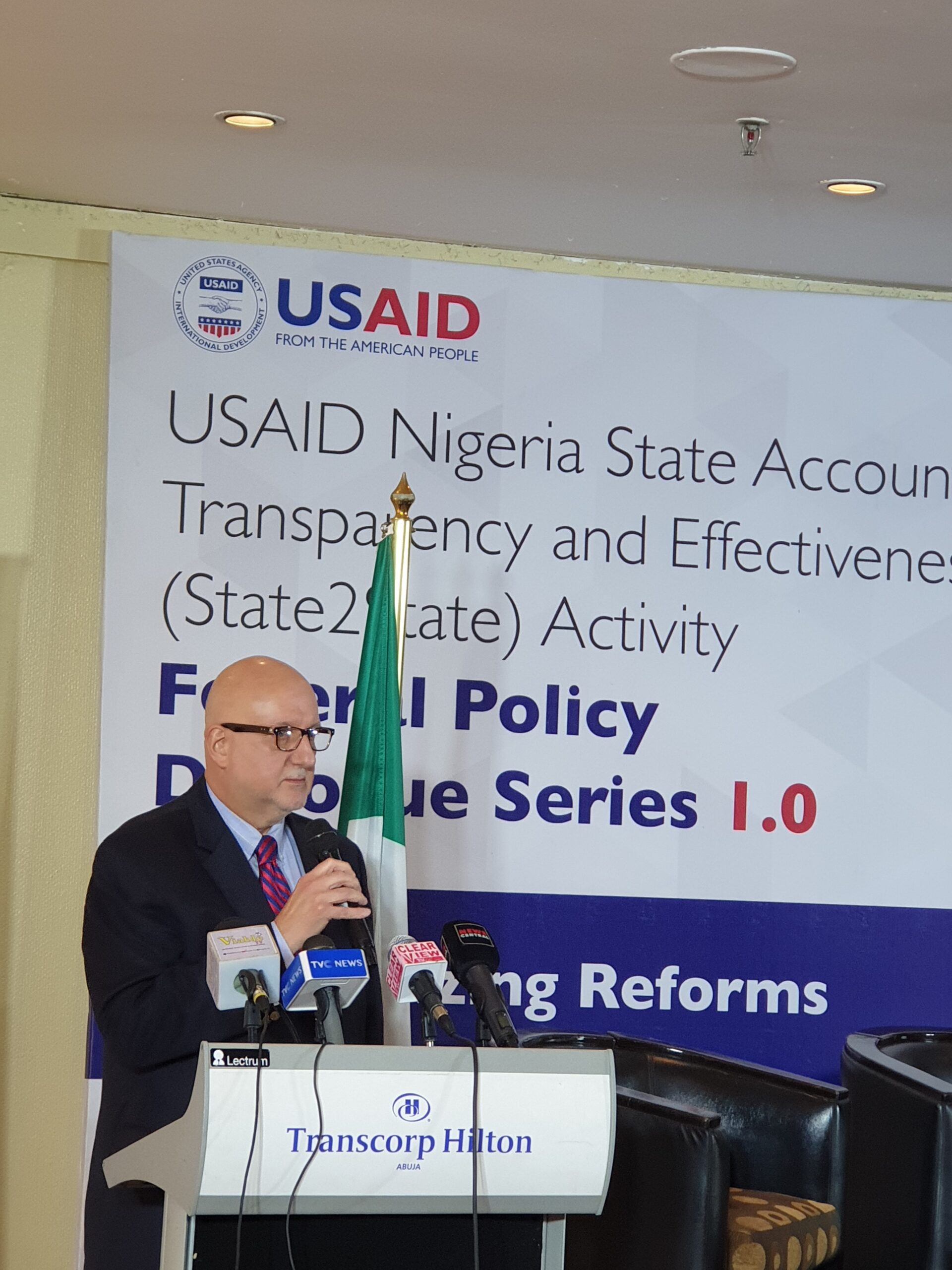By Ngozi James
The Nigerian Governors Forum (NGF) has disclosed that states have become more fiscally transparent, accountable with marked improvement is service delivery and overall governance.
Chairman of the Nigeria Governors’ Forum (NGF) Dr Kayode Fayemi, explained that the United States Agency for International Development (USAID) State Fiscal Transparency, Accountability and Sustainability (SFTAS) project is driving various reforms across focus states which is resulting in more effective governance.
The chairman, who was represented by the Sokoto State Governor, Aminu Tambuwal said this at the USAID inaugural edition of its Federal Policy Dialogue Series (FPDS) 1.0, under the Nigeria State Accountability, Transparency and Effectiveness (State2State) Activity on Tuesday in Abuja. The theme of the dialogue is “Post-State Fiscal Transparency, Accountability and Sustainability (SFTAS): Incentivising Reforms”
The dialogue had in attendance the six benefiting states of Adamawa, Akwa Ibom, Bauchi, Ebonyi, Gombe, and Sokoto states, and other key diplomatic, development, and government officials. Other participants include national-level CSOs and experts in Public Finance Management. As the world bank funded SFTAS projects ends in 2023, the dialogue is aimed at discussing its sustainability in states.
Fayemi, noted that beyond the initial financing of 700 million dollars in performance for results, the World Bank has injected additional 750 million dollars in performance for results.
Fayemi said states have undertaken some empowerment and worked with various stakeholders to strengthen fiscal transparency, accountability and sustainability. He further informed that states made investments in form of performance , technology to drive fiscal reforms like e- procurement, tax appreciation among others.
“Today ,there is greater and more citizens participation in the process, fiscal document published in friendly versions,” he said.
According to the Chairman, some of the reforms that have boosted fiscal transparency in the states include; the linkage of the BVN data to at least 90 percent civil servants and pensioners to reduce payroll fraud, passage of public procurement laws to strengthen procurement process, deployment of an e- procurement system to deliver efficiency and value for money, passage of state debt laws to strengthen states debt management practices among others .
Other are: the passage of consolidated revenue codes to harmonise taxes, fees, levies, charges and fines; the passage of audit laws guaranteeing financial and operational autonomy to the office of the auditor general for state and local government.
The chairman expressed the readiness of states to sustain the reforms beyond the USAID programme. He also informed that the 36 state governors under the umbrella if the NGF will unveil a charter on sustaining the reforms on fiscal transparency and accountability.
Hugh Brown ,State2State Chief of Party ,said the inaugural federal policy dialogue series marks the start of a more formal engagement at the federal level, having worked at the state level.
This, according to him is to help create a more favourable enabling environment where states and LGA areas can further improve operations regarding planning, budgeting, procurement, and revenue generation to benefit the people of Nigeria.
Brown, explained that the event aimed at discussing practical, relevant issues around incentivising reforms to which actions would be assigned to move forward and addressing the primary objective of the state to state activity.
Also speaking, Daniel Morris, the Deputy Director ,Peace and Democratic Governance Office ,USAID , commended the successes recorded in states under the activity .
Morris said that it served as a model for other USAID offices around the world interested in learning how to enact effective state reforms. “I have been encouraged to hear about the early progress states have made on reforms,” he said.
“This progress promises to reduce waste of scarce resources and to enable more to be devoted to such critical areas like basic education, primary health care, water and sanitation and hygiene services.
” I was pleased to learn that since last year, all six of the currently participating partner states use a more inclusive and transparent budgeting process exemplified in medium term expenditure framework and the full application of the national Charter of Accounts,” he further said.
Morris , therefore informed that the project would be reaching out to more states soon. He added that USAID would continue to partner with states to develop and sustain reforms to improve governance so that the quality of lives would continue to improve.
While giving her goodwill message, Ms. Tassin Pelzer Cecile , the Head of Corporation, EU Delegation to Nigeria and ECOWAS reiterated that reforms are integral to governments and institutions, explaining that they encourage transparency, accountability, fair and efficient distribution of resources and help countries make the most of their human and economic potential.
For Nigeria, she stressed that reforms are important to capitalise on the country’s many endowments to include: mineral resources, human capital, especially represented by the young population, diverse land and water resources, digital and creative drive, lead economic and political position on the continent.

